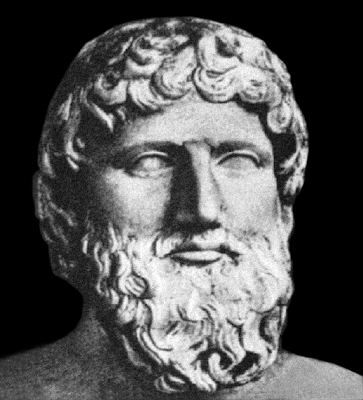Philosophy Is Basic
It's been around as long as people have been asking the question "Why?"
This is "The Thinker", he's a man who's reasoning and thinking over a problem, in other words......a philosopher
Deep thinking isn't the only quality you need to be a true philosopher, for philosophy is a complex subject that requires discipline, perseverance, and more than anything else large amounts of time
See "TIME" = good philosophy
.......one of the universally accepted qualities it is built on is logic, for a true philosophical idea must be backed up by a sound, reasonable argument.
See Bart understands this. He starts off with a clear thesis, then backs it up with the somewhat fallacious argument that if you can't prove otherwise he must be correct.
And just like Bart most philosophers undertake the art of philosophy for the same reason that most people undertake art in general; to better their life and the lives of the people around them. Though probably not what Kanye meant when he talked about the "Good Life"
maybe more of a Buddaish approach
or even a Gandhish outlook
The fact that philosophy can better your life has even been made profitable
Although we are unsure exactly where philosophy was created, it was first studied seriously as a discipline in the country of Greece
This is Socrates
He is one of the most well known philosophers ever
Although he didn't make Wayne's Top 10 list
He was also from a city in Greece called Athens
Socrates liked to hang out in the Agora (the Athenian marketplace) where all of Athens would congregate
Sadly, the Agora, like most other ancient structures is mostly ruins today but in Socrates' time it would have been the cultural hub for all of Athens
It was here that Socrates had most of his main philosophical discourse and asked questions of the everyday Athenian that are still central to present day philosophy
Questions such as "Do I control my environment or does my environment control me?"
This states one side of the argument but now it is a philosopher's job to think through the question and see if, while using the Socratic method, he can find an exception to this viewpoint
Well that was a lot to take in one sitting, maybe you should go take a break for awhile, remember one of the main tools used in philosophy is time to think through large ideas
Are you sure you're ready to go on??
Don't take this personally or anything but according to a 2004 National Health and Nutrition Survey about 66 % of Americans are either obese or overweight, so maybe all this sitting an reading isn't the best for you. And obesity isn't anything to be laughed at.....
......well except in this picture, but seriously obesity has been linked to diseases such as Type 2 diabetes, heart disease, hypertension, metabolic syndrome, e.d., infertility, and ovary syndrome; not to mention many different types of cancers
So let's make a deal, give me 5 solid jumping jacks and then you can keep going
And on to the Socratic Method......
So what is the Socratic method and how does it tie into philosophy?
The good news: it's not nearly this complicated
The Socratic Method is basically just an attack on ones preconceived convictions. The real method is comprised of a step system that first gets you into a mindset and then has an exact system to follow in order to challenge your beliefs but in short its a way (similar to the scientific method) that allows you to accurately challenge a belief or theory
Are next philosopher is Friedrich Nietzsche
Besides touting one of the cooolest mustaches ever seen.....ever, he like Socrates would also try to put theories to the test. Though unlike Socrates, Nietzsche was primarily interested in the single idea of "Amor Fati"
Amor Fati is essentially the idea of embracing your fate......
.......whether it be faithful or pleasurable and is fully explained in this quote:
"My formula for greatness in a human being is amor fati: that one wants nothing to be different, not forward, not backward, not in all eternity. Not merely bear what is necessary, still less conceal it—all idealism is mendaciousness in the face of what is necessary—but love it."
Nietzsche was also not averse to pain and believed it was a tool that we could use to more fully control our lives
And believed that responses to pain such as drowning it in alcohol
Or Religion
where always improper responses
Our next philosopher is Seneca
Seneca taught entirely on the over coming of anger
He believed that anger was in fact a poison that hurt who was angry much more than who the anger was directed at
Finally, Epicurus tells us how to be happy
He argues that there are natural and unnatural, and necessary and unnecessary desires that we all contain but that we only need natural and necessary ones.
He also laid down the 4 main things you need to be happy.
1. Friendship
2. Freedom
3. Time to Analyze Life





-bootleg-2007-(front).jpg)























